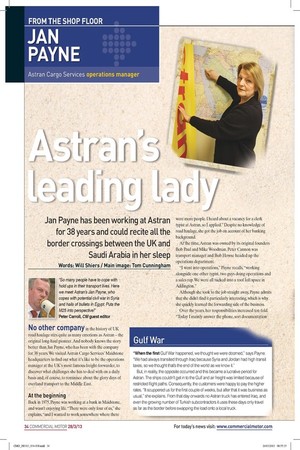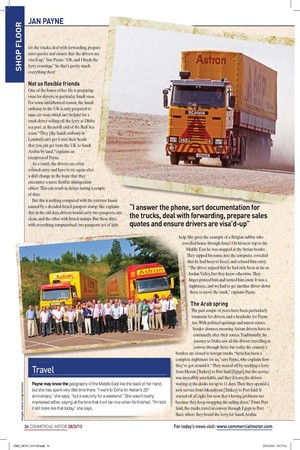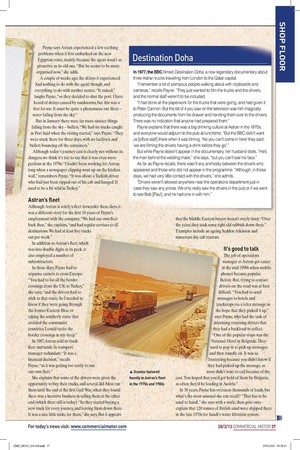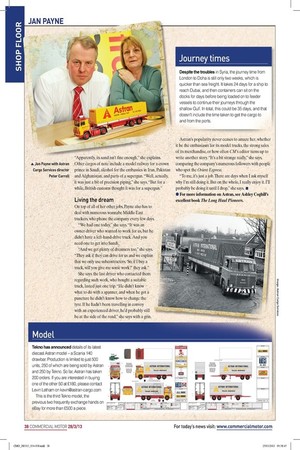ri\z:i.) r 1,--).;-41I(1 r ft,j Jan Payne has been working
Page 21

Page 23

Page 24

Page 25

If you've noticed an error in this article please click here to report it so we can fix it.
at Astran for 38 years and could recite all the border crossings between the UK and Saudi Arabia in her sleep Words: Will Shiers / Main image: Tom Cunningham No other companyin the history of UK road haulage stirs quite as many emotions as Astran — the original long-haul pioneer. And nobody knows the story better than Jan Payne, who has been with the company for 38 years. We visited Astran Cargo Services' Maidstone headquarters to find out what it's like to be the operations manager at the UK's most famous freight-forwarder, to discover what challenges she has to deal with on a daily basis and, of course, to reminisce about the glory days of overland transport to the Middle East.
At the beginning Back in 1975, Payne was working at a bank in Maidstone, and wasn't enjoying life. "There were only four of us," she explains, "and I wanted to work somewhere where there were more people. I heard about a vacancy for a clerk typist at Astran, so I applied." Despite no knowledge of road haulage, she got the job on account of her banking background.
At the time, Astran was owned by its original founders Bob Paul and Mike Woodman. Peter Cannon was transport manager and Bob Howse headed up the operations department.
"I went into operations," Payne recalls, "working alongside one other typist, two guys doing operations and a sales rep. We were all tucked into a roof loft space in Addington."
Although she took to the job straight away, Payne admits that she didn't find it particularly interesting, which is why she quickly learned the forwarding side of the business.
Over the years, her responsibilities increased ten-fold. "Today I mainly answer the phone, sort documentation for the trucks, deal with forwarding, prepare sales quotes and ensure that the drivers are visa'd-up," lists Payne. "Oh, and I book the ferry crossings." So that's pretty much everything then!
Not so flexible friends One of the banes of her life is preparing visas for drivers, in particular Saudi visas. For some unfathomed reason, the Saudi embassy in the UK is only prepared to issue air visas, which isn't helpful for a truck driver rolling off the ferry at Dhiba sea port, at the north end of the Red Sea coast. "They [the Saudi embassy in London] can't get it into their heads that you can get from the UK to Saudi Arabia by land," explains an exasperated Payne.
As a result, the drivers are often refused entry and have to try again after a shift change in the hope that they encounter a more flexible immigration officer. This can result in delays lasting a couple of days.
But this is nothing compared with the extreme hassle caused by a dreaded Israeli passport stamp. She explains that in the old days, drivers would carry two passports, one clean, and the other with Israeli stamps. But these days, with everything computerised, two passports are of little help. She gives the example of a Belgian subbie who travelled home through Israel. On his next trip to the Middle East he was stopped at the Syrian border. They tapped his name into the computer, revealed that he had been to Israel, and refused him entry. "The driver argued that he had only been as far as Jordan Valley, but they knew otherwise. They finger-printed him and turned him away. It was a nightmare, and we had to get another driver down there to move the truck," explains Payne.
The Arab spring The past couple of years have been particularly traumatic for drivers, and a headache for Payne too. With political uprisings and unrest comes border closures, meaning Astran drivers have to continually alter their routes. Traditionally, the journey to Doha saw all the drivers travelling in convoy through Syria, but today the country's borders are closed to foreign trucks. "Syria has been a complete nightmare for us," says Payne, who explains how they've got around it. "They started off by catching a ferry from Mersin [Turkey] to Port Said [Egypt], but the service was incredibly unreliable, and they'd leave the drivers waiting at the docks for up to 11 days. Then they opened a new service from Iskenderun [Turkey] to Port Said. It started off all right, but now that's having problems too because they keep swapping the sailing dates." From Port Said, the trucks travel in convoy through Egypt to Port Suez, where they board the ferry for Saudi Arabia. Payne says Astran experienced a few teething problems when it first embarked on the new Egyptian route, mainly because the agent wasn't as proactive as its old one. "But he seems to be more organised now," she adds.
A couple of weeks ago, the delays it experienced had nothing to do with the agent though, and everything to do with mother nature. "It rained," laughs Payne, "so they decided to shut the port. I have heard of delays caused by sandstorms, but this was a first for me. It must be quite a phenomena out there — water falling from the sky."
But in January there were far more sinister things falling from the sky — bullets. "We had six trucks caught in Port Said when the rioting started," says Payne. "They were stuck there for three days, with no facilities, and bullets bouncing off the containers."
Although today's journey east is clearly not without its dangers, we think it's fair to say that it was even more perilous in the 1970s. "I hadn't been working for Astran long when a newspaper clipping went up on the kitchen wall," remembers Payne. "It was about a Turkish driver who had just been ripped out of his cab and hanged. It used to be a bit wild in Turkey."
Astran's fleet Although Astran is solely a fleet forwarder these days, it was a different story for the first 10 years of Payne's employment with the company. "We had our own fleet back then," she explains,"and had regular services to all destinations. We had at least five trucks out per week."
In addition to Astran's fleet, which was into double digits at its peek, it also employed a number of subcontractors.
In those days, Payne had to organise carnets to cross Europe. "You had to list all the border crossings from the UK to Turkey," she says, "and the drivers had to stick to that route. So I needed to know if they were going through the former Eastern Bloc, or taking the southerly route that avoided the communist countries. I could recite the border crossings in my sleep."
In 1987, Astran sold its truck fleet and made its transport manager redundant. "It was a financial decision," recalls Payne, "as it was getting too costly to run our own fleet."
She explains that some of the drivers were given the opportunity to buy their trucks, and several did. Most ran them until the end of the first Gulf War, when they found there was a lucrative business in selling them at the other end (which there still is today). "So they started buying a new truck for every journey, and leaving them down there. It was a nice little niche for them," she says. But it appears that the Middle Eastern buyers weren't overly fussy: "Over the years, they took some right old rubbish down there." Examples include an ageing Seddon Atkinson and numerous day cab tractors.
It's good to talk The job of operations manager at Astran got easier in the mid-1990s when mobile phones became popular.
Before that, trying to contact drivers on the road was at best difficult. "You had to send messages to hotels and truckstops via a telex message in the hope that they picked it up," says Payne, who had the task of informing returning drivers that they had a backload to collect.
"One of the popular stops was the National Hotel in Belgrade. They used to pop in to pick up messages and then trundle on. It was so frustrating because you didn't know if they had picked up the message, as most didn't want to call because of the cost. You hoped that you'd got hold of them by Bulgaria, as often they'd be loading in Austria."
In 38 years, Payne has overseen thousands of loads, but what's the most unusual she can recall? "That has to be sand to Saudi," she says with a smile, then goes onto explain that 120 tonnes of British sand were shipped there in the late 1970s for Saudi's water filtration system. "Apparently, its sand isn't fine enough," she explains. Other cargos of note include a model railway for a crown prince in Saudi, alcohol for the embassies in Iran, Pakistan and Afghanistan, and parts of a supergun. "Well, actually, it was just a bit of precision piping," she says. "But for a while, British customs thought it was for a supergun."
Living the dream On top of all of her other jobs, Payne also has to deal with numerous wannabe Middle East truckers, who phone the company every few days.
"We had one today," she says. "It was an owner-driver who wanted to work for us, but he didn't have a left-hand-drive truck. And you need one to get into Saudi.
"And we get plenty of dreamers too," she says. "They ask if they can drive for us and we explain that we only use subcontractors. 'So, if I buy a truck, will you give me some work?' they ask."
She says the last driver who contacted them regarding such work, who bought a suitable truck, lasted just one trip. "He didn't know what to do with a spanner, and when he got a puncture he didn't know how to change the tyre. If he hadn't been travelling in convoy with an experienced driver, he'd probably still be at the side of the road," she says with a grin. Astran's popularity never ceases to amaze her, whether it be the enthusiasm for its model trucks, the strong sales of its merchandise, or how often CM's editor turns up to write another story. "It's a bit strange really," she says, comparing the company's numerous followers with people who spot the Orient Express.
"To me, it's just a job. There are days when I ask myself why I'm still doing it. But on the whole, I really enjoy it. I'll probably be doing it untill drop," she says. • • For more information on Astran, see Ashley Coghill's excellent book The Long Haul Pioneers.
"When the first Gulf War happened, we thought we were doomed," says Payne. "We had always transited through Iraq because Syria and Jordan had high transit taxes, so we thought that's the end of the world as we know it."
But, in reality, the opposite occurred and this became a lucrative period for Astran. The ships couldn't get in to the Gulf and air freight was limited because of restricted flight paths. Consequently, the customers were happy to pay the higher rates. "It scuppered us for the first couple of weeks, but after that it was business as usual," she explains. From that day onwards no Astran truck has entered Iraq, and even the growing number of Turkish subcontractors it uses these days only travel as far as the border before swapping the load onto a local truck. Travel Payne may know the geography of the Middle East like the back of her hand, but she has spent very little time there. "I went to Doha for Astran's 25'" anniversary," she says, "but it was only for a weekend." She wasn't overly impressed either, saying at the time that it will be nice when it's finished. "I'm told it still looks like that today," she says. Destination Doha In 1977, the BBC filmed Destination Doha, a now legendary documentary about three Astran trucks travelling from London to the Qatar capital.
"I remember a lot of pompous people walking about with clipboards and cameras," recalls Payne. "They just wanted to film the trucks and the drivers, and the normal staff weren't to be included.
"I had done all the paperwork for the trucks that were going, and had given it to Peter Cannon. But the bit of it you saw on the television was him magically producing the documents from his drawer and handing them over to the drivers. There was no indication that anyone had prepared them."
Payne explains that there was a big drinking culture at Astran in the 1970s, and everyone would adjourn to the pub at lunchtime. "But the BBC didn't want us [office staff] there when it was filming. No you can't come in here' they said, we are filming the drivers having a drink before they go'."
But while Payne doesn't appear in the documentary, her husband does. "He's the man behind the welding mask," she says, "but you can't see his face."
As far as Payne recalls, there wasn't any animosity between the drivers who appeared and those who did not appear in the programme. "Although, in those days, we had very little contact with the drivers," she admits.
"Drivers weren't allowed anywhere near the operations department just in case they saw any prices. We only really saw the drivers in the pub or if we went to see Bob [Paul], and he had one in with him." Journey times Despite the troubles in Syria, the journey time from London to Doha is still only two weeks, which is quicker than sea freight. It takes 24 days for a ship to reach Dubai, and then containers can sit on the docks for days before being loaded on to feeder vessels to continue their journeys through the shallow Gulf. In total, this could be 35 days, and that doesn't include the time taken to get the cargo to and from the ports.
Tekno has announced details of its latest diecast Astran model — a Scania 140 drawbar. Production is limited to just 500 units, 250 of which are being sold by Astran and 250 by Tekno. So far, Astran has taken 200 orders. If you are interested in buying one of the other 50 at £180, please contact Levin Letham on kevin@astran-cargo.com This is the third Tekno model, the previous two frequently exchange hands on eBay for more than £500 a piece.









































